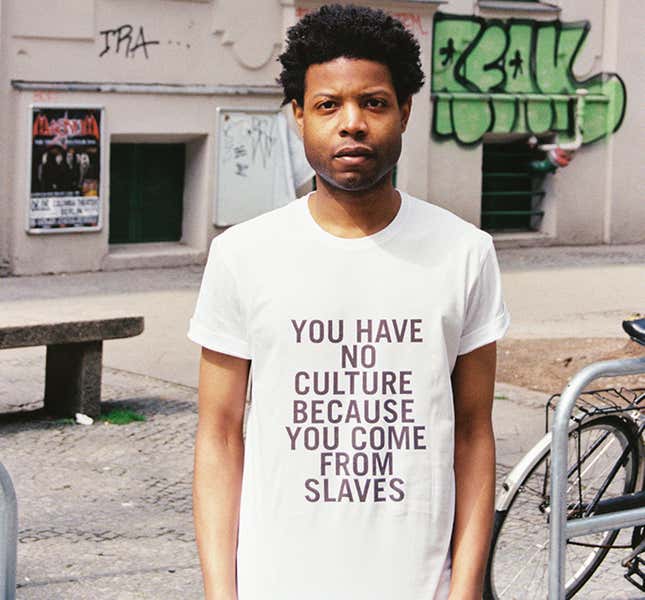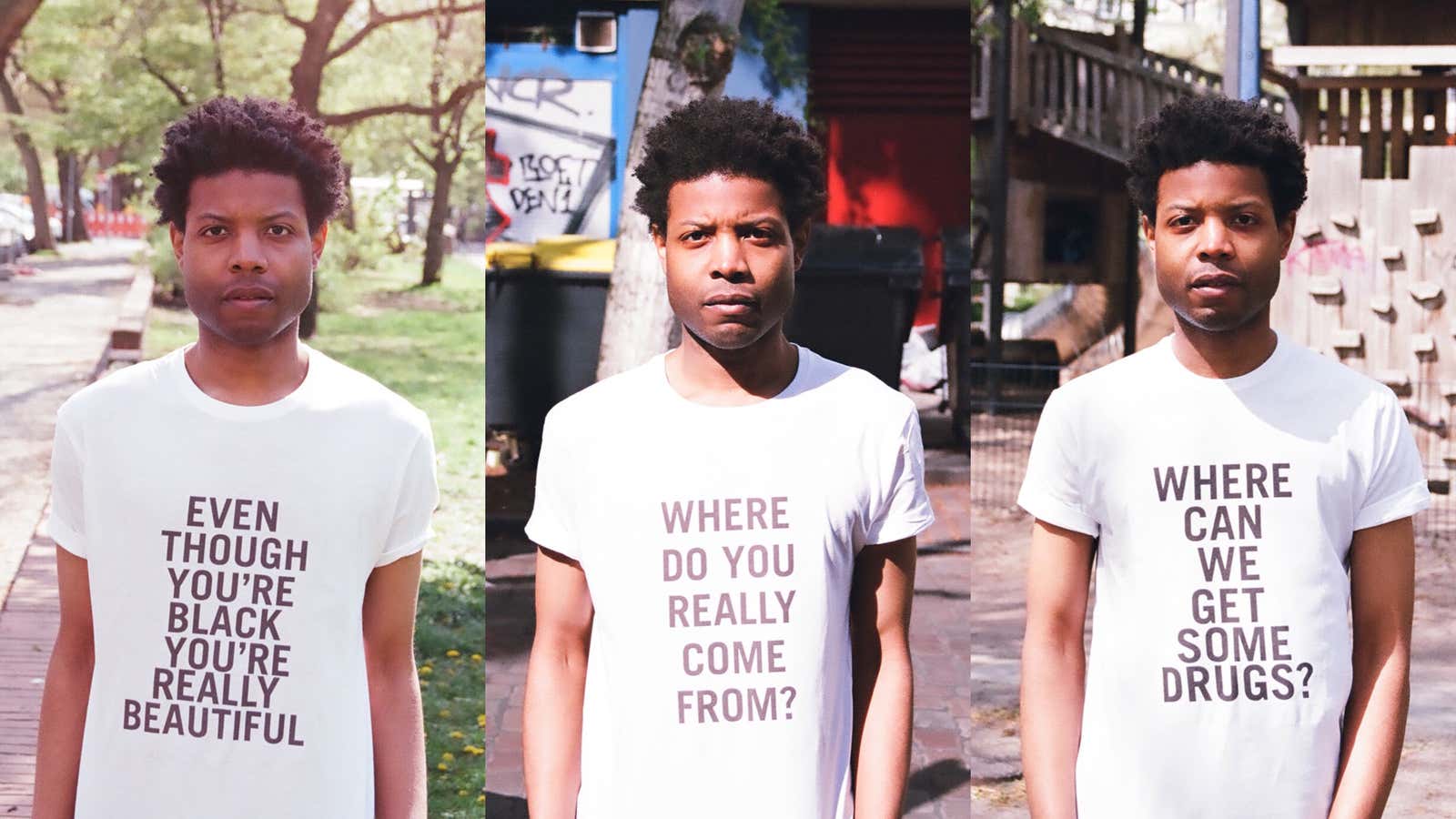Growing up black in Los Angeles, California, 36-year-old Isaiah Lopaz read about the Harlem renaissance, a black cultural awakening during the 1920s in New York, which saw an explosion in black art, music and literature. He was fascinated by Josephine Baker and her circle of artistic friends in Paris, where the singer, dancer, and activist was at the center of the new era of black pride. And Lopaz, who is gay, heard that Berlin is today’s best equivalent—a multicultural, artistic German city that is a “mecca for queer, gay life.”
After graduating from college with bachelor of fine arts, he packed up and left LA in his mid-twenties. “I’m going to move to Europe and its going to be great,” he thought. He completed two guest semesters at the Stadelschule in Frankfurt am Main, before making his way to Berlin in 2007.
He found it a less enlightened place than he had imagined. From his first days there, Lopaz was badgered with the same question: Where are you from? When Lopaz would explain he was born and raised in LA, the interrogator would interrupt and ask where his parents or grandparents are from. When he tried to answer, Lopaz would be interrupted again and asked what his roots to Africa were. (Three of Lopaz’s grandparents were half Native American, and his grandparents were part of The Great Migration, when six million Black Americans moved from the rural South US in search of a better life in the North and West. But like many African-Americans descended from slaves, Lopaz’s family roots are hard to trace.)
Lopaz soon found himself drawn into even more disturbing conversations. While buying groceries, he was stopped and asked if he had drugs to sell. (This would also happen in parties, art openings, and bars.) Berliners would proclaim, “I’m gay! I can’t be racist.” Lopaz was told he had no culture because he was a descendent of enslaved people in the US. Worst still, someone tried to insist that calling someone a Nazi is as hurtful as using the N-word.
“Germans are woefully ignorant when it comes to talking about anti-black racism,” Lopaz tells Quartz. “They’re not aware of various manifestations of racism, and they’re not aware of how race works as a construct… They don’t even like to talk about the word ‘race.’”

Lopaz responded with art. He took these conversations and put them on a series of white t-shirts with black lettering, and named the project Things You Can Tell Just By Looking At Him. While the t-shirts are not for sale, Lopaz has exhibited them as an installation that was including in an exhibit in Hamburg as part of an initiative called “The Week Against Racism.”
The project is ongoing, with Lopaz inviting several other people of African descent to participate. Lopaz hopes to exhibit photos of him and others in the t-shirts as part of a larger body of work that he is developing. “I am planning on photographing Black people in the UK, Italy and Belgium, cataloguing their experiences with anti-Black racism,” he explains.
The project wasn’t an attempt to educate white Germans on the racism he witnesses every day, Lopaz said. It was a message to other black people: “If you’re going through this and experiencing this, you’re not an anomaly,” he said. “These things are happening, and I see you.”
A country where race is unspoken
There are important differences in the way black people are racialized in the US and in Germany. When Lopaz first moved to Berlin 2007, he says: “I remember noticing there weren’t many black people in the street,” Lopaz says. “And that I was very much being made a spectacle of; people were looking at me, staring at me on the streets.” While the number of black people and people of color has increased over the last decade in Germany, they still remain an invisible minority.
Racial categories that are commonplace in the US and UK—such as white, black, and Asian—simply aren’t discussed in Germany. The government doesn’t measure the number of ethnic minorities in certain schools, universities, and jobs. The reasoning behind this is simple: Everyone is German, the thinking goes, and should be treated the same across the board. This approach might sound egalitarian, but it has meant there is little discussion of the deep-seated discrimination plaguing communities of color in education, housing, and employment, critics have warned.
One million refugees entered Germany at the peak of Europe’s refugee crisis in 2015. The inflow sparked a heated national debate on race and identity. In the run-up to last year’s election, Germany’s interior minister released a 10-point proposal for defining national identity, asserting among other things that “we don’t do burqa.” The far right’s campaign posters boasted headlines like: “Burqas? We like bikinis,” and “New Germans? We can make them ourselves.”
The refugee crisis gave a boost to the anti-immigrant party, Alternative for Deutschland (AFD)—and last year, German voters put a far-right party into parliament for the first time since the Second World War in the September election. While the focus has largely been on the things the AFD say about migrants, leading politicians in the party have also been accused of espousing anti-black racism too. AFD MP Jens Maier, who was elected last year, attacked Noah Becker (son of the German tennis star Boris Becker) over an interview in he said he was tired of being seen as the “eternal son” of his famous father. Maier went on to tweet: “It seems the little half-negro simply got too little attention—that’s the only explanation for his behavior.” (The tweet has since been deleted). Noah Becker, whose mother is of African-American descent, pressed charges against Maier for the tweet earlier this month.
Lopaz says he is sometimes asked which country is better for black people, Germany or the US. It’s a hard question to answer, he said. There’s the rise of visible racist rhetoric in Germany, but in the US, the threat of police brutality and other racial violence cannot be denied.
The last decade has seen a growth in black activism in Germany. “There are more international black communities that are linking up,” Lopaz says. “We are trying to speak up about racism and we’re also trying to create projects that foster community and spaces for conversations, transformations, and healing.”
